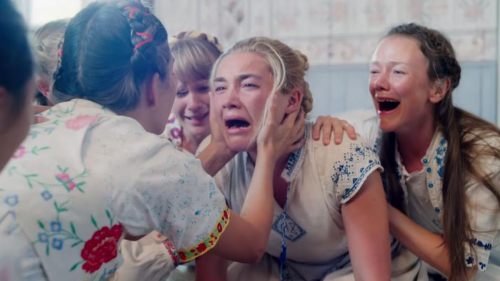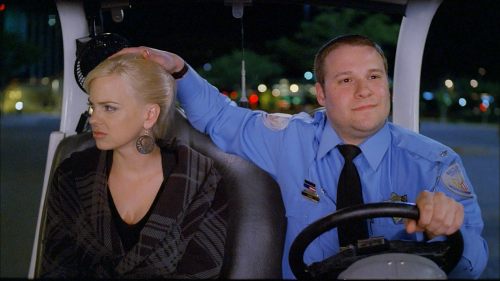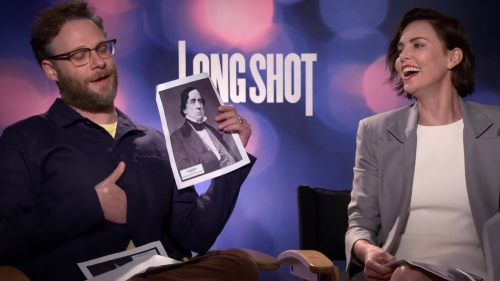ARIZONA Review: The Economy’s A Killer
"From 2000 to 2005, the United States experienced the biggest housing boom in its history. By 2006, home prices dramatically started to slide. Industry analysts predicted it would only be a temporary downturn. Then it all went to shit."
This is the opening title card of Arizona – a rather raucous slasher movie set in a near-abandoned housing development in the titular state, whose acts of violence occur immediately after the market collapse that this introductory text recounts. In an odd fashion, this gated ghost community of identical suburban homes serves as the perfect setting for a body count picture. Like John Carpenter's '78 stalk and slash granddaddy, Halloween – which, not coincidentally, star Danny McBride had a hand in writing an upcoming direct sequel to – Arizona creates a sense of isolated, store bought Americana that represented safety for many of its country's citizens during the mid-aughts.
Only now – thanks to a string of predatory loans and subsequently bloodthirsty foreclosures – that sanctuary has been infiltrated by dubious lending institutions (such as Countrywide Mortgage), yanking away this plastic dream from almost all who bought into it. Therefore, it's only logical that a few of the fleeced mob would potentially lose their minds, pick up a knife or gun (or both), and start laying bodies down on the manicured front lawns of these formerly booming developments. In a decimated middle America, new maniacs stalked; yet instead of donning Shatner masks, they sport golf visors and plaid shorts, smacking victims’ skulls with their Callaway drivers.
If these generically Spanish-themed desert villas are Arizona's answer to Haddonfield, then Rosemarie DeWitt's Cassie – a struggling, separated real estate agent – is the movie's Laurie Strode stand-in. Sadly enough, Cassie subscribed to the same materialistic reverie as her sucker customers. Now, the bank is constantly calling, she can't make a sale to save her life, her daughter Morgan (Lolli Sorenson) has even less hope for the future than she does, and her boss Gary (Seth Rogen) is a piggish asshole with zero sympathies for Cassie’s situation (despite being the one who sold her on this cookie cutter catastrophe). Even when the rep shows a property to buyers, she ends up leaving the potential patrons when the vacant home’s neighbor tries to hang himself from the ceiling fan. There’s just zero victories to be had in this desert wasteland.
Enter Sonny (Danny McBride) – a pastel Polo rocking, twice-divorced dolt who Gary also duped into believing his investment would double in worth within a few years. Now, Sonny's gone rogue, pushes Gary over the balcony of his sales office and kidnaps Cassie, holding her prisoner in the weapons depot that used to be his family’s ideal domicile. DeWitt allows us to feel genuine sympathy for a woman who recognizes the motivation behind this monster, but also that her sexed up work clothes represent the same awful lie that made him lose his mind. They both fucked up on multiple levels but, in this tragic moment, one must escape the madness of the other, especially once he threatens the life of her daughter.
Almost every character McBride’s created throughout the course of his career has teetered on the edge of being straight up insane. While we laugh at the antics of unhinged, disgraced relief pitcher Kenny Powers, or North Jackson High VP Neal Gamby, both of those characters demolished everything in their paths in the name of individual selfish pursuits, including watching best friends die of overdoses and burning down a rival’s home. In more ways than one, Sonny's frosted hair and impotent, GED-educated rage are just a natural extension of the dangerous McBride buffoons we've already come to know and love, while simultaneously acknowledging we'd keep them at arm's length, were they actual people we encountered during our daily endeavors.
Sonny’s golf club-swinging, gun-collecting homicidal impulses are Powers and Gamby taken to their logical conclusions: killing fools instead of possessing the thin thread of conscience that stops them from pulling the trigger. Sonny is Michael Myers, only the evil is man-made instead of elemental; he's a foul-mouthed psycho who might've gone another direction, had he been smart enough not to pour his life's savings into an avaricious scam. When you look into Sonny’s eyes, all you see are shreds of self-doubt, set ablaze by the very notion that he could be had in such tremendous fashion. His embarrassment transforms into marauding, sentient hate, dispassionately plowing through anything that remotely reminds him of these immense personal failings.
First time feature filmmaker Jonathan Watson was an assistant director and second unit man on Eastbound and Down and Vice Principals, respectively – not to mention owns a resume stretching back to Michael Bay's Bad Boys – which probably explains why Arizona feels like the extended season finale of a new Rough House Productions HBO series that we somehow missed the first seven episodes of. The film’s tone alternates between deadpan comedy and pitch-black violence, much like both Eastbound and Principals did, though there's definitely a bit more splatter than what diehard fans of those shows are used to.
Additionally, the multiple characters – including Luke Wilson as Cassie's understanding ex, Kaitlin Gillies as his far younger, possibly smarter girlfriend, David Alan Grier as the local one-man police department, and Kaitlin Olson as Sonny's shrill second spouse – all seem to be experiencing climaxes of character arcs we didn't get to experience. It’s frustrating but also economical, establishing a storytelling shorthand that strangely still works, if you’re willing to fill in the gaps yourself. It certainly helps that each of these goofballs are gifted their own acidic moments to shine – as Luke Del Tredici’s (The Life & Times of Tim) script is often as funny as it is nasty – and would feel right at home in either of McBride’s previous sharp episodic comedies.
In fairness, these shortcuts aren’t going to work for everyone and, even if they do, still lead to Arizona being uneven and even somewhat lacking in narrative satisfaction. Still, the genuine anger the picture displays – trying to package a point about the helplessness those who were swindled by an indifferent economic system endured – feels genuine, even if the genre packaging it comes wrapped in is a touch rough. Arizona is sure to please regular McBride enthusiasts; especially those looking to see the comedic actor flex his performative muscles into much darker territory (though the constant violence against women is certainly going to be a cause for concern for many). So, while the movie might've benefitted from being allowed just a little more room to breathe in the editing bay (clocking in at a breakneck 85 minutes), that doesn't stop it from delivering a dose of often hilarious horror thrills.
Arizona is available now in select theaters and on VOD.



